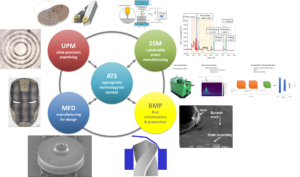
At the Manufacturing Innovation Network (MIN) Laboratory, our mission is to develop Appropriate Technology for Society (ATS) by advancing five key areas pertinent to advanced manufacturing – Ultra-Precision Machining (UPM), Sustainable Smart Manufacturing (SSM), Burr Minimization & Prevention (BMP) and Manufacturing for Design (MFD). We wish to leverage our knowledge in these five areas to further our understanding of material deformation during machining and develop novel technologies that help industries improve their process efficiencies, reduce downtime, energy consumption, and scraps and promote advanced manufacturing in the United States.
UPM research is focused on machining difficult to cut materials, error budgeting in ultra-precision machine tools, and development of peripheral equipment. Difficult to cut materials such as ceramics, tool steels, and tungsten carbide are being used in a wide range of applications from electronics and aerospace to biomedical implants and optics due to their superior properties and ability to perform under harsh environments. Our research goal is to understand the fundamental material removal mechanism during ultra-precision machining and develop strategies to improve the throughput of the machining process. Since it is important to maintain tight tolerances and form accuracy in the mentioned applications, we also develop models to predict and compensate for the position-independent and position-dependent geometric errors in ultra-precision machine tools. Further, we design and develop peripheral equipment such as tool-work contact detection systems for ultra-precision machine tools that help in achieving quick tool setup with an accuracy of less than 100 nm.
Developments in UPM, in terms of the variety of material classes that can be machined, geometries that can be created and tolerances that can be achieved, i.e., the feasibility of unrealistic machining quality removes typical design constraints and new avenues are created for designers to explore and develop new products for a wide range of applications. This new manufacturing paradigm is called Manufacturing for Design (MFD).
BMP research aims at reducing and preventing burr formation during machining processes such as drilling and milling. Prevention of burr formation is vital in automotive and aerospace applications to mitigate failure due to dislodged burr particles in case of engines or fretting fatigue wear in sandwiched aerospace panels. An expert system has been developed to aid in the selection of process parameters during the corresponding machining operations to reduce or prevent burr formation.
SSM is focused on leveraging artificial intelligence and industry 4.0 approaches to develop robust interconnected systems that constantly monitor the state of different machines in a factory and prompt preventive actions in case of deviations from normal operation and optimize energy usage. We perform real-time machine monitoring by installing various sensors on different classes of machines, collecting data using a secure data-link, and using AI and ML algorithms to monitor the operation of the machines. The developed system will notify the operator of any anomalies and help conduct preventive maintenance and reduce scrap parts. Energy usage optimization is carried out through the development of energy consumption models of various machine tools and devising innovative strategies such as design optimization of machine tools, strategic operation control, energy balance on the production line, energy footprint analysis, and control of supply chain.